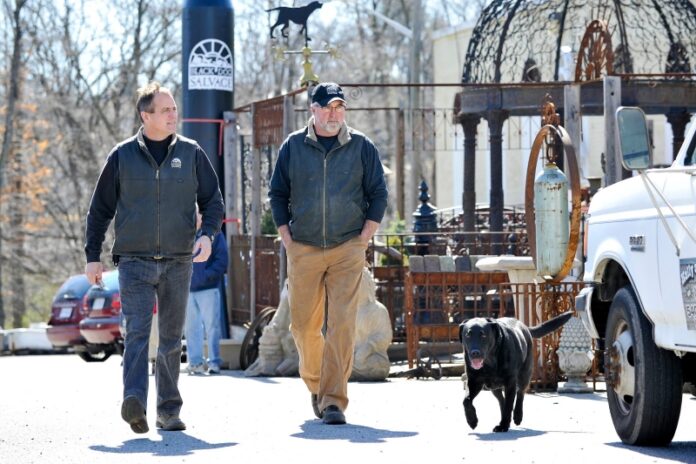
A chance encounter during a fishing trip on the James River with a TV reality show producer led to “Salvage Dawgs,” the DIY network show that follows the adventures of Mike Whiteside and Robert Kulp of Black Dog Salvage. They’ve owned Black Dog for 13 years – their business bids on about-to-be-demolished structures, which they salvage for items that can be resold.
Some of those items may be antiques, others wind up being repurposed as artwork, some of it, well, is just stuff from demolished homes that can be reused.
The second season of Salvage Dawgs on DIY premiered last week. Repeats are shown at times on the much larger HGTV network. The duo told their story at the most recent Roanoke Regional Forum, a series staged by the Regional Chamber of Commerce. “Mike is the right angle and I’m the loose cannon on deck,” quipped Kulp to a sizeable crowd at Jefferson Center’s Fitzpatrick Hall.
Forum president Todd Marcum called Whiteside and Kulp “standard bearers for our region.” They met in 1999 at a construction project. “I recall going, who is this guy?” said Kulp. Whiteside, a former Naval officer, was closing down a business, “figuring out what to do.” Soon Black Dog Salvage was born. They “dared” TV producer Billy Hayes to do a pilot on their business. It didn’t sell at first but eventually DIY picked it up. Trailblazer Productions puts Salvage Dawgs together.
Two houses salvaged in Roanoke will appear during this second season. They said during those two episodes viewers will have plenty of chances to get a flavor for the valley. “We love promoting Roanoke,” said Whiteside. Now people from “all over the country,” according to Kulp, know what Black Dog Salvage is. “People are surprised when they come to our shop, that we actually do this for a living,” quipped Whiteside.
Salvage Dawgs forces the business partners to stay on their toes as well. “We have to have projects for them to film,” said Kulp. The same crew that filmed “Kate + 8” shoots Salvage Dawgs. The secret to making their business work (it’s based on Memorial Avenue) is finding “a key piece,” noted Kulp. They have salvaged Eiffel Tower replicas, a vintage barber chair, the façade from a vaudeville theater…and lots of bathroom fixtures. “Polish it up, sell it to the world,” noted Whiteside.
Kulp also said they are keeping junk out of the waste stream – he called Black Dog Salvage “environmental capitalists…a business based model for sustainability.” Kulp labeled himself a preservationist: “We are the last step [before the landfill] once we get there – we’re taking action.” Local artists have also found Black Dog Salvage, often showing off their work “amongst the salvage,” as Kulp put it.
They know it won’t last forever but Salvage Dawgs “has allowed us to expand our reach,” said Whiteside. “Our business has increased radically since the exposure.” Adds Kulp: “We’re making every effort to capitalize on a fleeting opportunity. We’ve got to do it right now.” That also means they aim for higher end salvage jobs now – a payroll that has tripled compels them in part to do that. Now they get calls every day from people that want them to come look at potential salvage sites. “It’s off the charts,” said Whiteside.
Twenty-six episodes (13 per season) are in the can and they’re already scouting jobs for a third season. “Pretty incredible houses that we’re looking at for season three,” said Whiteside, who said that in his “own mind” he did see himself as a television star. “No – this is a total fluke,” he quickly adds, “I liken it to a lotto ticket. We’re really very lucky.”
After 13 years in the salvage business said Whiteside, “we’ve figured it out a little bit.” Having a cable TV show doesn’t hurt either.
By Gene Marrano

